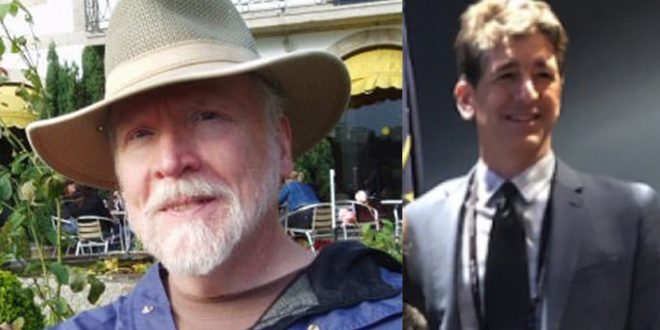Podcast: Play in new window | Download (Duration: 8:29 — 7.8MB)
By Sarah Vaughan
A carbon fee and dividend policy proposed by Citizens’ Climate Lobby could be a game changer for the environment, according to CCL volunteer lobbyists Robert Meitus and Richard Durisen. They believe an issue as large as climate change requires a large, collectively driven solution.
“I kinda realized that, no matter what I do personally – driving a Prius, buying solar panels for our home, recycling, using less plastic – it’s still not gonna be nearly enough,” said Mietus, a local lawyer and law professor at Indiana University’s Maurer School of Law.
Durisen is a retired Indiana University Astronomy professor, and CCL’s primary liaison to Republican Senator Trey Hollingsworth.
“I’ve been concerned about climate change for decades because as a planetary scientist, I knew about the greenhouse effect and I knew it was gonna cause trouble,” Durisen said. “I remember talking to people in the 1970’s that the use of fossil fuels was a problem. By the turn of the millennium I was pretty much in despair about anything being done about it, politically.”
Over the past decade, Citizens’ Climate Lobby has advocated for a carbon fee and dividend policy. The policy puts a price on carbon at its source, then gives that money back to American families. Supporters say it will not only level the playing field for renewable energy, it could spur technological innovation, and infrastructure development.
Durisen first heard about the policy in a talk Meitus gave a few years back at Bloomington’s Unitarian Universalist Church.
“I thought, wow – this has possibility! It might have the right politics to get passed and was to scale of the problem. The problem is global, it’s huge, it permeates our economy and civilization, so you can’t just do one thing — you can’t just insulate your house — you’ve got to deal with it throughout the economy. I got involved because this was the first idea I’d ever heard that seemed possible to get passed politically because it had conservative elements as well as liberal elements,” Durisen said.
Meitus points to the tremendous external costs that come from carbon based fuel production. Those external costs are absorbed by society, and he sees that as an unfair advantage for energy producers.
“We’re living in a world that we believe needs a quick solution to climate change. With rising temps and emissions, CO2, and equivalent emissions of methane, nitrous oxide and sulfur — we need to put a cap on it,” he said.
CCL’s carbon fee and dividend policy made it into proposed federal legislation in 2018 as The Energy Innovation and Carbon Dividend Act, but the Act didn’t make it out of Congress last year. This year, CCL’s policy has made it into House Resolution 763. House Resolution 763 would shift the cost to carbon based energy sources, to level the playing field between fossil fuel and renewables. It starts with a fee on carbon.
“You put a price on carbon emissions, you assess it at as close as you can to the point of extraction of the fossil fuel, you have the fee accelerate over time, you start at $15 per ton of CO2 emissions or equivalent if it’s some other greenhouse gas, and it increases by 10 dollars a ton each year. The idea is that imposing a really large price — the kind that’s effective in switching us away from fossil fuels — would be too much of a jolt in the economy. The idea is to do it gradually, but unrelentingly. And it also allows businesses to plan, they know what’s coming once you establish the fee,” Durisen said.
“So if we decrease the carbon based emissions, then the fee base goes down and eventually we’re moved — over 100 percent is our goal — to renewable energy sources,” Meitus said.
The fees would then be returned to citizens as a dividend.
“And the idea of that is that for households, they would start getting checks every month of a few hundred dollars that would help buffer some of the increased prices for products, due to the rising cost of energy and carbon products. That way the money is kept in the economy,” Durisen said. “The whole idea of this kind of approach is that you’re trying to correct an error in the market. The market is not pricing fossil fuels in a way that’s consummate with their cost to us. It’s important to keep the money involved circulating in the economy so that you’re not distorting the economy itself,” he said.
Some other countries are already using a carbon fee similar to CCL’s proposal.
“I would point to British Columbia, and European nations. British Columbia is right next door and they’ve done it for over ten years,” Meitus said.
In a statement published in the Wall Street Journal in January, over three thousand U.S. economists publicly said they support a carbon tax. Co-signers to that statement include four former chairs of the Federal Reserve. But Congress is proving tougher to convince.
CCL launched a lobbying blitz in June that put more than five hundred citizen lobbyists on Capitol Hill in search of new co sponsors for House Resolution 763. The group says the effort landed them 15 new
cosponsors for the bill – but none from Indiana. And so far, they’re all Democrats.
Meitus was part of that effort, meeting with Bloomington’s representatives Senators Todd Young and Mike Braun, as well as an aide from Representative Trey Hollingsworth’s office.
“I mean Senator Young, five or six years ago, wasn’t even acknowledging openly there was a climate change problem. His conversations with us have been very respectful, and while we have not gotten him to sign on yet, we do feel we are far closer to that end, and they are very respectful with us in this discussion,” Meitus said.
According to CCL, House Resolution 763 now has a total of 59 co-sponsors, which it says is more than any carbon pricing bill has ever had. But the bill will need support from another 159 representatives to pass out of the House.
Both Durisen and Meitus say carbon fee and dividend legislation will pass eventually, and they’re willing to keep lobbying until it does.
“People ask us, why do you keep banging your head against the wall, this isn’t gonna happen,” Mietus said. “We say we know it will happen when the time is right, we’re trying to make that time that is right, sooner rather than later.”
Citizen’s Climate Lobby is planning another lobbying push in Washington this November. Locally, a raft of volunteers works to keep carbon fee and dividend legislation in the forefront of legislators minds through emails and phone calls.
 WFHB Bloomington Community Radio
WFHB Bloomington Community Radio


